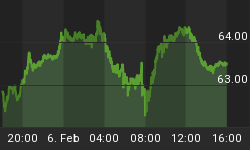... No Not Really! The "Non-Bounce" in Non-Revolving Credit
Joe Weisenthal writing for Business Insider reports Consumer Credit Demolishes Expectations, Grows $19 Billion.
It's hard to think that the economy is going into any kind of recession with numbers like these. For the second straight month we just got a HUGE number on consumer credit
Consumer credit expanded by $19 billion in December. That's far more than the $7 billion that was expected by economists.
This chart from Reuters' Soctty Barber basically tells it all.
The data on which that chart was produced was the Consumer Credit - G.19 government report.
Demolishing the Revolving Credit Side of the Story
Lance Roberts of Streettalk Live demolishes the revolving credit side of Weisenthal 's story (a $4 billion December rise) in an excellent perspective Consumer Credit and the American Conundrum.
Demolishing the Non-Revolving Credit Side of the Story
My job is to demolish the non-revolving side of Weisenthal's story, and it's an exceptionally easy task to do.
Non-Revolving credit rose $11.8 billion in December. However, $8.8 billion of that is growth in federal government loans (which just happens to be where student loans are parked).
Here are some charts I put together stripping out federal government loans.
Non-Revolving Loans Minus Government Loans
Non-Revolving Loans Minus Government Loans Detail
True Bounce in Percentage Terms
Note that the year-over-year "bounce" has not even gotten back to the zero-line in spite of exceptionally easy comparisons.
Middle-Aged Borrowers Pile on Student Debt
Reuters reports Middle-Aged Borrowers Pile on Student Debt
Educational borrowing is up for every age group over the past three years, but it has grown far more quickly among those between 35 and 49, according to the analysis of more than 3 million credit reports provided to Reuters by the credit score tracking site CreditKarma (CreditKarma.com). That group saw its school debt burden increase by a staggering 47 percent, according to the analysis.
The average student loan debt for those aged 38 to 41 was the biggest of that group -- about $12,000, up from just under $9,000 in 2009. Young people still carry the biggest student loan burdens; those aged 26 to 29 have an average of $14,000 in student debt. But the increased levels in middle-aged student debt is a new phenomenon.
Negative Payback on Retraining
The benefit of going back to school at age 49 is likely negative.
My friend "BC" comments:
The payoff for 40- and 50-somethings taking on debt to change occupations or trying to find jobs in "health care" or "education" and compete with Millennials trying to secure similar positions is low or negative.
Statistically, the benefit to "education" occurs between ages 14 and 22, where one goes to high school and university. Obtaining an MBA, law degree, or another graduate degree after age 26-28 historically has not resulted in a net benefit in terms of job/career prospects or wage/salary income; and this has become particularly the case since the late '90s.
In other words, the vast majority of people running up debt at universities, community colleges, and for-profit technical schools are wasting their time and money, as well as directing scarce resources to the "health care" and "education" sectors that don't need more misallocation further driving up costs.
Needless to say, there is no precedent in US history for middle-aged unemployed, underemployed, or unemployable Americans running up debt in an economy that has not created a net new private sector full-time job per capita in at least 10 years.
Fewer Nonfarm Employees Now Than December 2000
Here is one key chart (of many) from Fewer Nonfarm Employees Now Than December 2000; Unemployment Rate: Some Things Still Don't Add Up; Obamanomics?
Total Nonfarm Employees
There are currently 132,409,000 nonfarm employees. In December of 2000 there were 132,481,000 employees. How's that for job growth?
Retraining Scam
Job retraining is scam perpetrated by for-profit universities, fueled by statements from Obama regarding re-training people for new jobs.
Brick-layers are told they can be "chefs", take $10,000 courses and the universities call it a "success" if they land a job "in their field" at McDonald's. Unemployed roofers are led to believe they can become Java programmers, and they waste collective $billions trying. Meanwhile out of work Java programmers are told to take up a trade like roofing or auto mechanics.
The cost of education keeps rising because Obama (like Bush before him), keeps adding to the student loan program when the entire student loan scam really needs to be shut down.
Why Does the Scam Roll On and On?
- No politician wants to stand up and tell the truth: Retraining is a waste of money and the odds of launching a new career in other than a low-paying job requiring few skills is simply not likely.
- For-Profit universities pad politicians' pockets
One can always find success stories, but in aggregate, retraining middle-aged workers is a net waste of money.
To Paraphrase Joe Weisenthal
Now, to paraphrase Joe Weisenthal: "It's hard to think that the economy is NOT going back into a recession with numbers like these." The difference in viewpoint is understanding what the underlying numbers really represent.
















